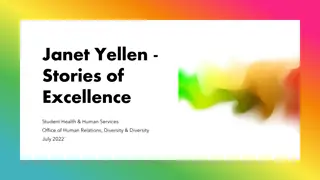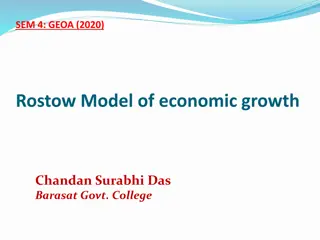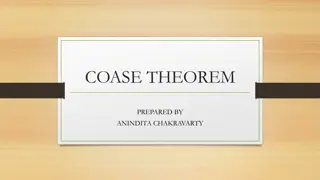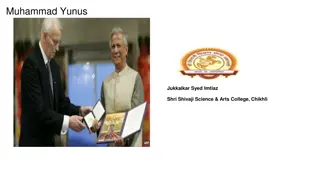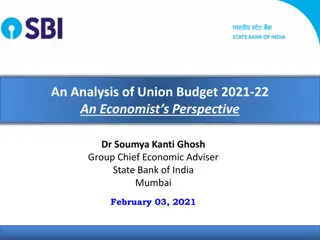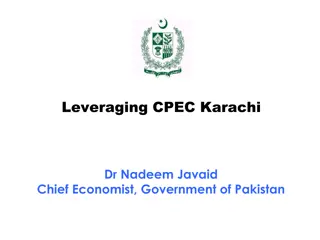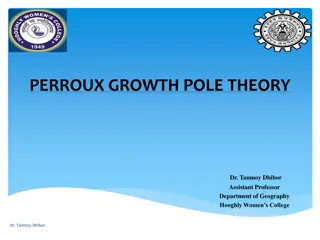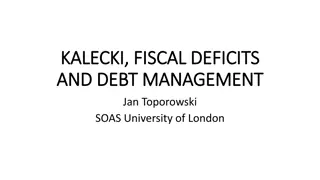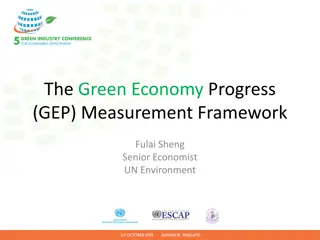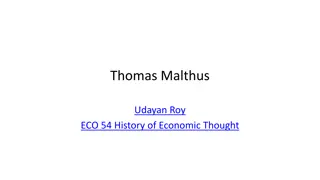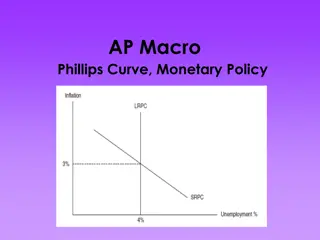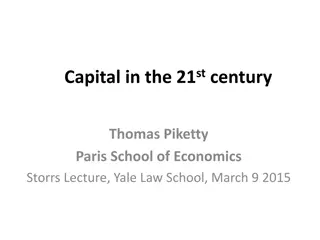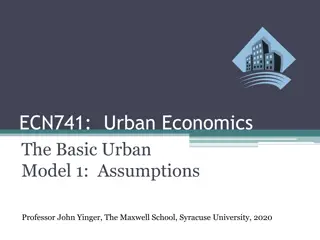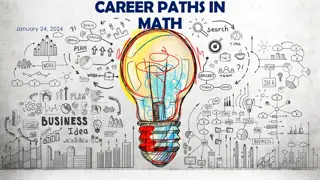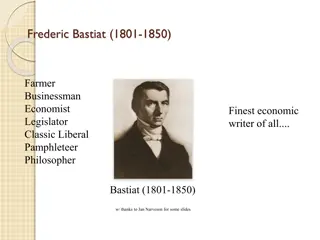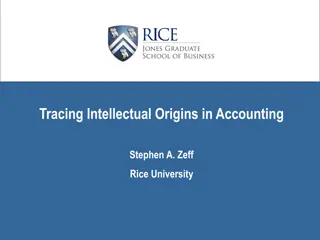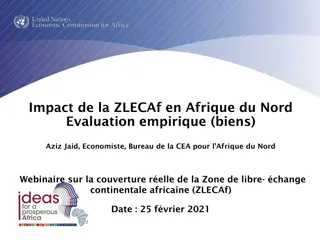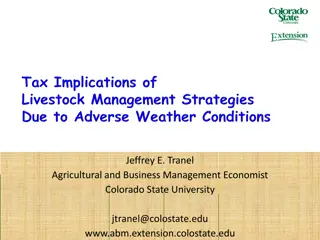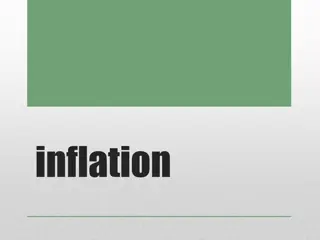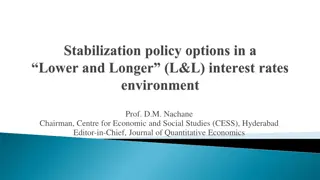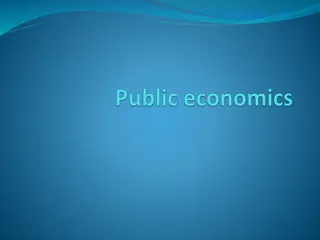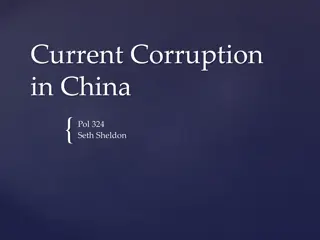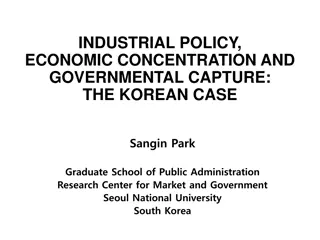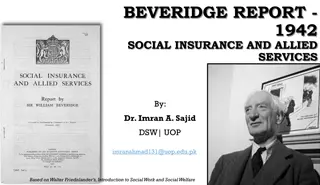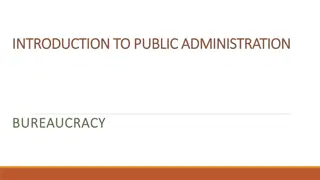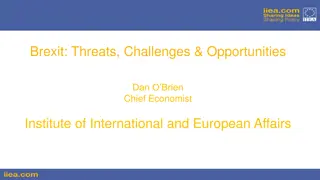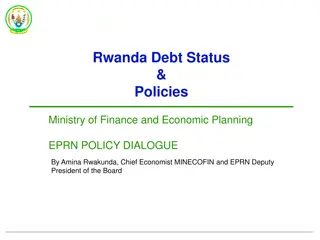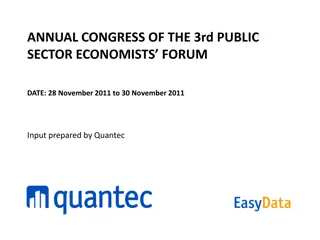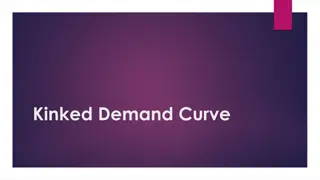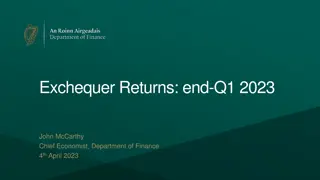Government Economic Service: Assistant Economist Scheme Overview
Welcome to the Q&A session providing an overview of the Government Economic Service (GES) and details about the Assistant Economist Scheme application process. Learn about the benefits of working in the Civil Service, the role of economists in government, and the message from Sam Beckett, Head of th
4 views • 18 slides
Janet Yellen: Achievements of the First Female U.S. Secretary of the Treasury
Janet Yellen, an American economist and civil servant, made history as the first woman to hold the position of United States Secretary of the Treasury. From her education at Brown University and Yale to her early career as a professor and her groundbreaking roles in economic leadership, Yellen's acc
6 views • 11 slides
Walt Whitman Rostow's Model of Economic Growth - A Historical Perspective
Walt Whitman Rostow, an economist, proposed the Stages of Economic Growth theory in 1960, outlining the five stages through which countries pass to achieve economic development. His model reflects Western capitalist ideologies and was influenced by Cold War politics. Rostow's theory aimed to guide d
0 views • 19 slides
Understanding the Coase Theorem: Property Rights and Economic Efficiency
The Coase Theorem, developed by economist Ronald Coase, posits that under certain conditions, bargaining related to property rights will lead to an optimal outcome regardless of the initial distribution. It provides a framework for resolving conflicts by emphasizing negotiation and efficient market
0 views • 10 slides
Biography of Muhammad Yunus: Nobel Laureate and Microfinance Pioneer
Muhammad Yunus, born in 1940 in Bangladesh, is a renowned banker, author, and economist known for his pioneering work in microfinance. His efforts led to the establishment of Grameen Bank and earned him the Nobel Peace Prize in 2006. Yunus's journey from academia to poverty reduction initiatives in
0 views • 9 slides
Analysis of Union Budget 2021-22: Economist's Perspective by Dr. Soumya Kanti Ghosh
The analysis provides insights into the fiscal arithmetic of FY21 and projections for FY22, including capital expenditure growth, revenue receipts, non-tax revenue, disinvestment targets, and measures for financial consolidation. It highlights the shift towards greater transparency in finances and t
5 views • 11 slides
Exploring the Economic Impact of CPEC in Karachi and Pakistan
Delve into the comprehensive analysis of the China-Pakistan Economic Corridor (CPEC) and its implications on Karachi's development, featuring insights from Dr. Nadeem Javaid, Chief Economist of the Government of Pakistan. Discover the strategic cooperation fields, industrial zones, developmental tar
0 views • 23 slides
Understanding Perroux Growth Pole Theory by Dr. Tanmoy Dhibor
The Perroux Growth Pole Theory, developed by French economist Francis Perroux in 1955, focuses on economic development and structural change. Dr. Tanmoy Dhibor discusses how modern economic growth differs from traditional equilibrium concepts, emphasizing growth towards specific locations. The theor
0 views • 15 slides
Principles of Fiscal Deficits and Debt Management According to Kalecki
Economist Kalecki advocated for a permanent regime of fiscal deficits to manage public debt, emphasizing the importance of debt management for liquidity in the financial system. His principles involve splitting the government budget into functional and financial parts, each influencing aggregate dem
0 views • 6 slides
The Green Economy Progress Measurement Framework Overview
The Green Economy Progress (GEP) Measurement Framework, spearheaded by Fulai Sheng, a Senior Economist at UN Environment, emphasizes an Inclusive Green Economy (IGE) as a tool for sustainable development. It addresses poverty, inequitable prosperity sharing, and planetary boundary concerns by integr
0 views • 6 slides
Thomas Malthus and His Theory on Population Growth
Thomas Robert Malthus, an influential economist, proposed a theory on population growth in the 18th century. His theory suggested that population grows exponentially while food production increases at a slower rate, leading to inevitable food scarcity. Malthus also discussed the concept of preventiv
2 views • 19 slides
Understanding the Phillips Curve and Its Implications
The Phillips Curve, introduced by economist A.W. Phillips in 1958, initially showed an inverse relationship between unemployment rate (u%) and inflation rate (tt%). This led policymakers to consider a trade-off between reducing unemployment and increasing inflation. However, the concept faced challe
0 views • 22 slides
Dynamics of Income and Wealth Inequality in the 21st Century
French economist Thomas Piketty discusses the global dynamics of income and wealth distribution since the 18th century in his presentation, highlighting the shift from rising income inequality to rising wealth inequality. He delves into the long-term evolution of capital/income ratios, wealth concen
0 views • 78 slides
Analysis of P/C Insurance Industry Trends and Outlook
The Property/Casualty (P/C) insurance industry has seen three consecutive years of growth from 2013-2015, with a potential continuation in 2016. Net premium growth rates, catastrophic losses, and combined ratio points associated with catastrophe losses are key indicators examined in this overview. D
0 views • 62 slides
The Basic Urban Model - Origins and Key Concepts
The Basic Urban Model originates from German economist Johann Heinrich von Thünen, focusing on bidding and sorting in urban economics. It examines how activities sort across locations based on land bids and transportation costs to a central market. The model illustrates rent variations for differen
0 views • 42 slides
Career Paths in Mathematics: A Comprehensive Overview
Explore various career paths in mathematics including roles such as accountant, actuary, auditor, data analyst, economist, mathematician, statistician, and teacher. Each profession utilizes mathematical skills in unique ways, from financial calculations to risk management and data analysis. Discover
0 views • 14 slides
Insights from Frederic Bastiat on Law, Liberty, and Plunder
Frederic Bastiat, an eminent economist and philosopher, delves into the topic of law, its purpose, and the misuse of power in society. He critiques how laws can be perverted to serve individual greed and false philanthropy, leading to legal plunder. Bastiat emphasizes the importance of protecting ri
0 views • 23 slides
Tracing Intellectual Origins in Accounting: A Journey of Thought Evolution
Tracing the intellectual origins in accounting reveals the roots and influences behind current theories and practices. This process involves connecting the dots across decades to understand the intellectual baggage inherited from the past. Different streams of thought in US accounting literature, st
0 views • 41 slides
Lessons from Gordon Tullock: A Legacy of Iconoclasm
Gordon Tullock, an influential economist at George Mason University, challenged conventional wisdom by applying economic principles to politics. He viewed politics as a ruthless game of self-interest, analyzing dictatorships and revolutions with a cynical yet insightful perspective. Tullock's iconoc
0 views • 6 slides
Impact of ZLECAf in North Africa: Empirical Evaluation
The Economist, Aziz Jaid, from the CEA Bureau for North Africa conducted an empirical evaluation on the impact of the ZLECAf in North Africa, focusing on goods. The context includes coverage of seven countries, the rationale behind the ZLECAf agreement, and details on the liberalization scenarios an
0 views • 13 slides
Evaluating City Liveability: Indexes, Rankings, and Youth Perspectives
Explore different indexes for evaluating city liveability, including The Economist Intelligence Unit's ranking and Mercer's Quality of Living Ranking. Discover the most liveable cities globally and delve into the important factors for cities according to the Youth Millennials Survey of 2016. Engage
0 views • 10 slides
Strategies for Optimizing Livestock Management: A Detailed Analysis
Explore various strategies for enhancing livestock management in agricultural operations, including options like buying supplemental feed, leasing additional pasture, and selling cattle strategically to defer recognition of gains. Learn about tax implications, replacement options, and the impact on
0 views • 16 slides
Visual Exploration of Various Concepts and Terms with Images
Dive into a visual journey showcasing different concepts such as inflation, economist, basics, consumer behavior, stability, decline, boosting, funds, outlaw, currency, cordial relationships, and more through a collection of vivid images. Explore the depths of economic, financial, societal, and scie
0 views • 126 slides
Challenges and Alternatives in Monetary Policy During Economic Depressions
The zero lower bound (ZLB) poses challenges to conventional monetary policy during severe depressions, leading to prolonged periods of low interest rates. Mainstream macroeconomic theory falls short in providing effective guidance, prompting the exploration of alternate mechanisms such as taxation,
0 views • 29 slides
Theories of Growth in Public Expenditure: Adolph Wagner's Hypothesis
Adolph Wagner, a prominent German economist, put forth a hypothesis on the growth of public expenditure, linking it to economic development. Wagner's theory suggests that as per capita income rises, public expenditure increases proportionally due to expanded traditional functions, coverage of new fu
0 views • 35 slides
Understanding Corruption in China: Insights and Reforms
The state-controlled nature of many prominent businesses in China, mixed with instances of corruption and inefficiency at various levels, highlights challenges faced by the government and public discontent. Economist Adam Hersh suggests a complex relationship between government-owned and privately o
0 views • 10 slides
South Korea's Economic Development: Achievements and Challenges
South Korea's remarkable economic growth, described as a "miracle" by Nobel laureate economist Robert E. Lucas, Jr., showcases the country's successful developmental strategy. Led by the government and centered around chaebols, large business groups, South Korea overcame institutional challenges thr
0 views • 25 slides
The Beveridge Report and its Social Welfare Impact During World War II
The Beveridge Report, commissioned during the Second World War, led to significant social welfare reforms in Britain. Under the chairmanship of William Beveridge, the committee assessed the country's social services, paving the way for recommendations that shaped the future of social insurance and a
0 views • 16 slides
Understanding Max Weber's Bureaucracy Theory
Max Weber, a renowned sociologist and political economist, developed the Theory of Bureaucracy in the early 20th century to address the challenges of industrial revolution in Germany. His principles emphasized efficiency and effectiveness in organizational administration. Despite some misconceptions
0 views • 23 slides
Brexit: Threats, Challenges & Opportunities in the UK and Irish Economies
Delve into the intricacies of Brexit's impact on the UK and Irish economies as discussed by Dan O'Brien, Chief Economist at the Institute of International and European Affairs. Explore the threats and challenges faced, while also uncovering potential opportunities that lie ahead amidst this uncertai
0 views • 23 slides
Rwanda Debt Status & Policies - Ministry of Finance and Economic Planning Presentation
Rwanda's debt status and policies were discussed in a presentation by Amina Rwakunda, Chief Economist at MINECOFIN. The global context of debt, including Africa's rising debt post-relief initiatives, and the increasing vulnerabilities and causes were outlined. Challenges, recent developments, and re
0 views • 18 slides
Quantec - South African Consultancy Providing Economic and Financial Data
Quantec is a South African consultancy specializing in economic and financial data, business intelligence, and analytical software for over 18 years. They offer services such as data collections, market analysis, and economic modeling, and are the African representative of renowned organizations lik
0 views • 11 slides
Understanding the Kinked Demand Curve Hypothesis in Oligopoly Markets
In oligopoly markets, prices often remain rigid despite cost changes. The kinked demand curve hypothesis, introduced by economist Sweezy, explains this phenomenon. It suggests that the demand curve an oligopolist faces has a kink at the current price level, with elastic demand above and inelastic de
0 views • 4 slides
Overview of Exchequer Returns for End-Q1 2023
The Exchequer Returns for End-Q1 2023, as reported by John McCarthy, Chief Economist of the Department of Finance, indicate a year-on-year increase in total revenue, driven by growth in tax revenue. However, non-tax revenue decreased significantly. Expenditure also saw a notable rise, particularly i
0 views • 12 slides

